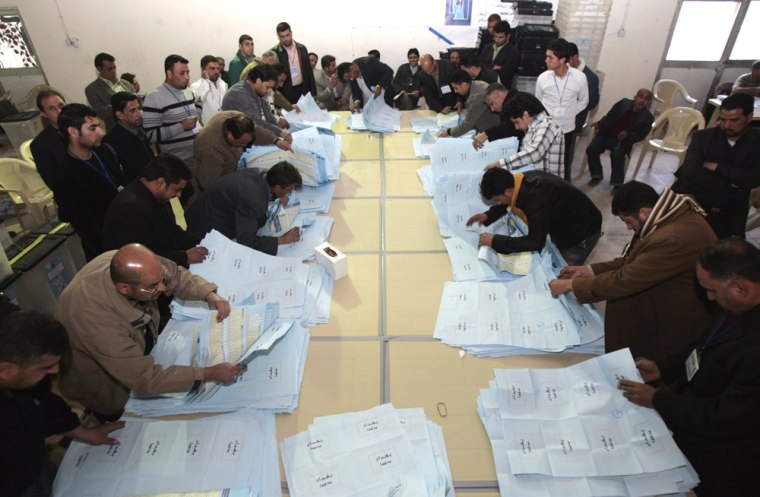The Iraqi prime minister's party finished first in races for ruling councils in Baghdad and eight other provinces during last weekend's provincial elections, officials said Thursday — a strong endorsement of his campaign to restore order in this war-ravaged country.
The election commission announced that Prime Minister Nouri al-Maliki's party won 38 percent of the votes in Baghdad in Saturday's election, followed by allies of anti-U.S. cleric Muqtada al-Sadr and a Sunni party with 9 percent each.
In Basra, the country's second biggest city, the prime minister's followers won 37 percent to 11.6 percent for the Supreme Islamic Iraqi Council, the biggest Shiite party.
Both cities were racked by Shiite militia violence for years until al-Maliki ordered a crackdown last spring, ending the rule of gunmen.
Voters chose ruling councils in 14 of the 18 provinces in the first election since December 2005.
The vote was aimed at redistributing political power at the local level and was widely seen as a dress rehearsal for national parliamentary elections at the end of the year. U.S. officials were watching the outcome for signs of whether Iraq was stable enough for significant troop withdrawals this year.
Suicide bombing in Kurdish city
As a sign of continued instability, a suicide bomber blew himself up Thursday inside a crowded restaurant in a Kurdish city near the Iranian border, killing at least 12 people, Iraqi officials said. The attack in Khanaqin occurred as ethnic tensions have been rising following last weekend's elections.
Kurdish and police officials who gave the casualty toll said most of the victims were Kurds lunching at the popular Abu Dalshad restaurant. Police chief Col. Azad Eisa said 12 other people were wounded in the attack.
Khanaqin, 90 miles northeast of Baghdad, has been a source of friction between Kurds and the Arab-run central government. Hundreds of Kurds complained on election day that they couldn't find their names on voter registration lists.
Salahuddin Kokha, an official with the local chapter of a Kurdish political party, said the attack was meant to upset Kurdish claims of a strong showing in elections in mainly Sunni Diyala province.
"Terrorists want to destroy the happiness of the Kurds over their election victory in Khanaqin," Kokha said. "All of those killed were civilians."
Tension over Anbar voting
In the days following elections, tension was mounting elsewhere. Early returns leaked by political parties have led to allegations of irregularities in several provinces, particularly Anbar province, a former Sunni insurgent stronghold west of the capital.
Tensions between rival Sunni parties have been running high in Anbar, causing Iraqi authorities to ask U.S. troops to stand by in case of trouble following Thursday's elections announcement.
A leader of the Awakening Councils — Sunni tribesmen who turned against al-Qaida in the area — has complained that rival Sunnis stole the election, a charge they denied.
A Sunni party led by Saleh al-Mutlaq won in Anbar with 17.6 percent. The Awakening Council list finished close behind at 17.1.
Meanwhile, Maj. Gen. Tariq Yousif, chief of the provincial police, said he had asked U.S. troops to patrol outside the cities in case of trouble.
"The American troops are deploying now in Anbar province," Yousif told The Associated Press by telephone. "We have an agreement with the American troops to support us in case of any emergency."
The U.S. military did not respond to a request for comment.
Anbar was handed over to Iraqi control last year but U.S. Marines remain there in support of the Iraqis.
On Wednesday, a top leader of the Awakening Councils, Sheik Ahmed Abu Risha, told Al-Arabiya television his group had "hundreds of documents" to prove the number of votes was inflated in Anbar to throw the election to the Islamic Party, which controls the provincial administration and is part of the national government.
Will losers accept results?
Voting in Anbar and elsewhere in the country took place without major violence. But U.S. and Iraqi officials fear there could be trouble if the losers don't accept the results. Elections will be held later in four northern provinces, three of them in the Kurdish self-governing region.
Also on Thursday, a roadside bomb targeted a Shiite candidate for provincial election in Baqouba, northwest of Baghdad, an Iraqi police officer said.
Salim al-Zeidi escaped injury when the bomb exploded outside his home, said the officer, who spoke on condition of anonymity because he was not authorized to release the information.
In a separate attack, a roadside bomb targeted a government convoy that was carrying a deputy education minister.
Ministry spokesman Waleed Hussein said the bomb exploded Thursday morning as the convoy passed through the Baghdad neighborhood of Mansour. He said deputy education minister Muadh al-Jibouri escaped injury.
